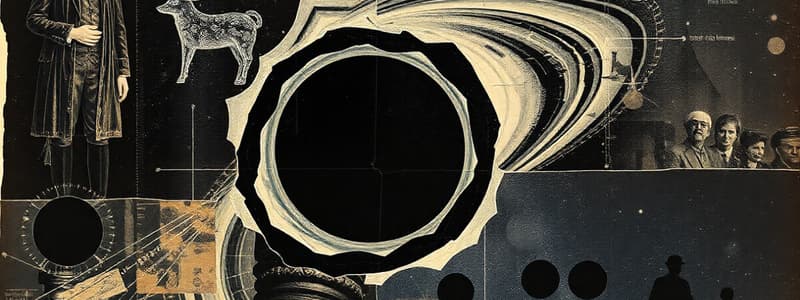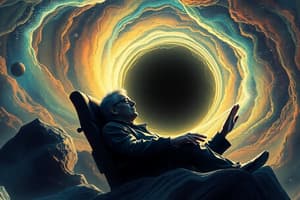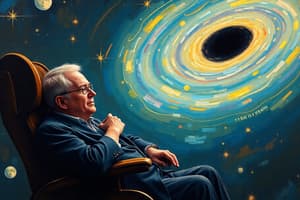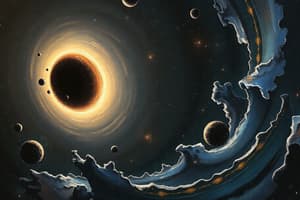Podcast
Questions and Answers
Hawking's work with Roger Penrose demonstrated that the collapse of a dying star could lead to what phenomenon?
Hawking's work with Roger Penrose demonstrated that the collapse of a dying star could lead to what phenomenon?
- The creation of a 'singularity,' a point in space-time that is infinitely dense and small. (correct)
- The formation of a white dwarf star with increased luminosity.
- The transformation of the star into a stable neutron star with a strong magnetic field.
- The dispersion of the star's matter into a nebula of radioactive elements.
What pivotal insight, derived from quantum theory, did Stephen Hawking introduce regarding black holes in 1974?
What pivotal insight, derived from quantum theory, did Stephen Hawking introduce regarding black holes in 1974?
- Black holes are capable of indefinite expansion, eventually consuming entire galaxies.
- Black holes are merely theoretical constructs, lacking any physical manifestation in the universe.
- Black holes possess an impenetrable event horizon, preventing any matter from escaping.
- Black holes emit heat and eventually evaporate due to quantum effects. (correct)
What was the subject of Stephen Hawking's PhD thesis?
What was the subject of Stephen Hawking's PhD thesis?
- The exploration of quantum entanglement.
- The application of game theory to economic models.
- The properties of expanding universes. (correct)
- The study of the human genome.
Which of the following statements accurately describes the method by which Stephen Hawking communicated after losing his voice?
Which of the following statements accurately describes the method by which Stephen Hawking communicated after losing his voice?
What is the significance of the 'X-ray binaries' detected by astronomers in 1964?
What is the significance of the 'X-ray binaries' detected by astronomers in 1964?
What was the original motivation behind Stephen Hawking's fascination with black holes during his time at Cambridge?
What was the original motivation behind Stephen Hawking's fascination with black holes during his time at Cambridge?
In what year did Stephen Hawking become Cambridge's Lucasian Professor of Mathematics, a chair once held by Isaac Newton?
In what year did Stephen Hawking become Cambridge's Lucasian Professor of Mathematics, a chair once held by Isaac Newton?
In what year was Stephen Hawking diagnosed with Amyotrophic Lateral Sclerosis (ALS)?
In what year was Stephen Hawking diagnosed with Amyotrophic Lateral Sclerosis (ALS)?
Which concept did Karl Schwarzschild hypothesize in the 1910s, predating the formal coining of the term in 1967?
Which concept did Karl Schwarzschild hypothesize in the 1910s, predating the formal coining of the term in 1967?
Which publication significantly contributed to Stephen Hawking's cultural stardom, marking a pivotal moment in communicating complex scientific ideas to the public?
Which publication significantly contributed to Stephen Hawking's cultural stardom, marking a pivotal moment in communicating complex scientific ideas to the public?
How did Hawking's black hole theories evolve following discussions with Jacob Bekenstein?
How did Hawking's black hole theories evolve following discussions with Jacob Bekenstein?
What key insight regarding black holes did Stephen Hawking's work reveal, challenging classical assumptions?
What key insight regarding black holes did Stephen Hawking's work reveal, challenging classical assumptions?
What crucial contribution did Roger Penrose make to the study of general relativity and black holes?
What crucial contribution did Roger Penrose make to the study of general relativity and black holes?
Considering Hawking's concept of the universe's origin, how did he address inquiries about events preceding the Big Bang?
Considering Hawking's concept of the universe's origin, how did he address inquiries about events preceding the Big Bang?
How did Hawking integrate general relativity and quantum mechanics in his groundbreaking 1974 publication?
How did Hawking integrate general relativity and quantum mechanics in his groundbreaking 1974 publication?
What broader implication does Hawking radiation have for the ultimate fate of black holes, according to his theories?
What broader implication does Hawking radiation have for the ultimate fate of black holes, according to his theories?
How did Penrose's development of 'Penrose diagrams' contribute to the understanding of black holes?
How did Penrose's development of 'Penrose diagrams' contribute to the understanding of black holes?
What was the initial reception of Hawking's theory regarding black hole radiation among the scientific community?
What was the initial reception of Hawking's theory regarding black hole radiation among the scientific community?
What is the fundamental significance of the constant creation and annihilation of particle-antiparticle pairs in the context of Hawking radiation?
What is the fundamental significance of the constant creation and annihilation of particle-antiparticle pairs in the context of Hawking radiation?
Considering the ongoing quest for a 'theory of everything', what role did Hawking's work play in this pursuit?
Considering the ongoing quest for a 'theory of everything', what role did Hawking's work play in this pursuit?
Flashcards
Singularity
Singularity
A point in space-time where the density is infinitely high and volume infinitely small, often formed by the collapse of a massive star.
A Brief History of Time
A Brief History of Time
Stephen Hawking's popular science book that explores the past, present, and future of the Universe in an accessible manner.
Black Holes
Black Holes
Regions in space-time where gravity is so strong that nothing, not even light, can escape.
Hawking's Black Hole Proof
Hawking's Black Hole Proof
Signup and view all the flashcards
Key Discovery
Key Discovery
Signup and view all the flashcards
ALS
ALS
Signup and view all the flashcards
Hawking Honor
Hawking Honor
Signup and view all the flashcards
Hawking's Book Impact
Hawking's Book Impact
Signup and view all the flashcards
Hawking Radiation
Hawking Radiation
Signup and view all the flashcards
Black Hole Evaporation
Black Hole Evaporation
Signup and view all the flashcards
Twistor Theory
Twistor Theory
Signup and view all the flashcards
Penrose Diagrams
Penrose Diagrams
Signup and view all the flashcards
Pairs of Particles
Pairs of Particles
Signup and view all the flashcards
Study Notes
- Stephen Hawking stated the Universe could have started from a singularity.
- Hawking likened the beginning of the Universe to the South Pole.
- According to Hawking, asking what happened before the Universe began is meaningless.
- In 1972, Hawking refined his black hole theories following a debate with Israeli physicist Jacob Bekenstein.
- Hawking's refined theories considered the laws of quantum mechanics, which deal with matter and energy behavior on the scale of atoms and subatomic particles.
- Quantum mechanics describes that pairs of particles and antiparticles are constantly meeting and annihilating each other throughout the Universe.
- Hawking calculated this occurs near the event horizon where the negatively charged particle falls into the black hole.
- The positively charged half streams away from the black hole's edge as radiation, known as Hawking radiation.
- Black holes lose energy and mass through black hole evaporation.
- Over eons, black holes continue to leak radiation and particles until they disappear in a final explosion.
- In 1974, Hawking published his calculation showing how the Universe began and how black holes evaporate.
- Hawking combined insights from the theory of the infinitely large (Einstein's general theory of relativity) and the theory of the infinitely small (quantum mechanics).
- Hawking produced a significant clue in modern physics' quest to find a single, unified "theory of everything" to explain the nature of the Universe.Hawking's discovery determined that black holes are not really black, but emit thermal radiation due to quantum effects.
- This was among the most important findings of 20th-century physics.
- Hawking's formula for Hawking radiation was initially rejected but has since become universally accepted.
- In 1979, Hawking was appointed Lucasian Professor of Mathematics at Cambridge University, a post he held until 2009.
- He continued to research black holes despite his disabilities.
- He received many accolades and high honors for his contributions to physics.
- Hawking wrote several popular science books, including A Brief History of Time, which was a runaway success.
- In his final years, he traveled widely, giving public lectures about his work.
- According to Stephen Hawking in 2008 "Black holes are stranger than anything dreamed up by science fiction writers, but they are firmly matters of science fact."
- Time, space, energy, and matter began from a single dense point of energy, a singularity.
- A Brief History of Time stayed on the Sunday Times bestseller list for 237 weeks.
- Hawking won the Breakthrough Prize in Fundamental Physics, worth $3 million.
- British mathematician and theoretical physicist Roger Penrose (1931-) is known for his work on black holes and the Big Bang theory.
- In the 1960s, Penrose was a reader and then professor in applied mathematics at Birkbeck College, London.
- In 1969, Penrose collaborated with Stephen Hawking to prove that black holes can arise from the gravitational collapse of massive stars.
- The paper by Penrose and Hawking was published by the Royal Society of London in 1970.
- Penrose also developed twistor theory, a key tool in quantum theory.
- Penrose created a way of mapping the regions of space-time around a black hole, know as Penrose diagrams.
- Penrose diagrams visualize the effect that gravity has on an object approaching a black hole.
Milestones
- Hawking wrote his PhD thesis, "Properties of expanding universes," in 1966, stating that the Universe started from a singularity.
- Hawking proved that gravitational singularities may exist while working with Roger Penrose in 1970.
- In 1974, Hawking made a key discovery, drawing on quantum theory to predict that black holes emit heat and eventually evaporate.
- Hawking became Cambridge's Lucasian Professor of Mathematics in 1979, a chair once held by Isaac Newton.
- He published A Brief History of Time in 1988, which became an instant hit.
Studying That Suits You
Use AI to generate personalized quizzes and flashcards to suit your learning preferences.





